Module 3 Period Two
Period one
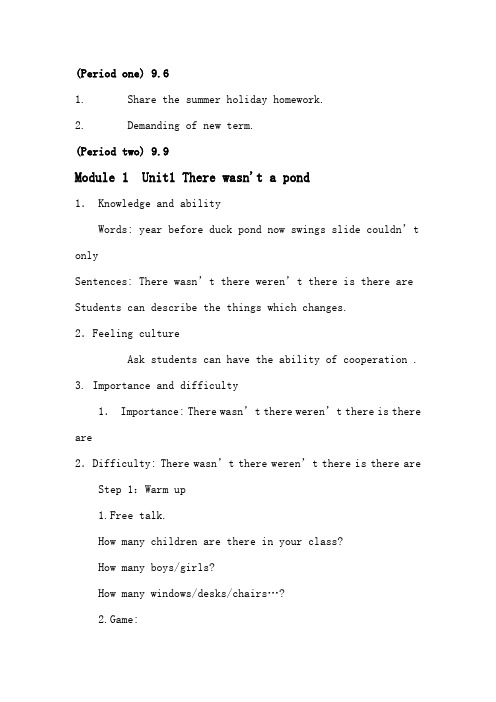
(Period one) 9.61. Share the summer holiday homework.2. Demanding of new term.(Period two) 9.9Module 1 Unit1 There wasn't a pond1. Knowledge and abilityWords: year before duck pond now swings slide couldn’t onlySentences: There wasn’t there weren’t there is there are Students can describe the things which changes.2.Feeling cultureAsk students can have the ability of cooperation .3. Importance and difficulty1.Importance: There wasn’t there weren’t there is there are2.Difficulty: There wasn’t there weren’t there is there are Step 1:Warm up1.Free talk.How many children are there in your class?How many boys/girls?How many windows/desks/chairs…?2.Game:Look, there is a box on the desk.What’s in the box? to guess the things using the structure of there be.Step 2:Presentation and practice1. Before Listening:T: We know Lingling is going to go to England with Amy. Today they are going to go tothe park. Let’s study. Please open yours books and look at the pictures then answer.T: Where are they?S: Linging is in London with Sam and AmyThey are in a park.T: What’s the park like now?There are swings here. swingThere is a pond. pondThere are ducks, too.2. While listening:1).Listen and pair work.Q1: Does this park look different now?different, look differentYes, it does. This park is different.Q2: Were there any swings here before? beforeNo, there weren’t.There weren’t any swings here before.There weren’t (以前) 没有(复数),教读。
外研版高考英语选修6 Module 3《Interpersonal Relationships》第2

Period Two Language PointsⅠ、单词拼写1。
They like to get together and c________ about their old days、2.He is dishonest、He is not worth t________、3.While the teacher is doing experiments,they watch c________、4.Why do you think we can’t change your 100.yuan n____________?5。
She suddenly burst into l________ when she heard the story、6.He sat on the chair,s________ his legs、7.They r________ a variety of vegetables last year、8。
His father was very angry at his t________;he lacked nothing、Ⅱ、选词填空burst out,lose interest in,get/come to know,turn round,from time to time,raise money,knock over,hold up1。
When did you ________________ her?2。
Every time she thought about him she ______________ crying、3.The old lady was ________________ by a car when turning around the corner of the street、4。
As he grew older,he ____________________ everything except gardening、5.He called at our home ________________________________、6.She ________________ and found a cat following her、7.They are going to ________________ for the school buildings、8.An accident is ________________ traffic、Ⅲ、同义词辨析1。
公开课MODULE 3 My First Ride on a Train-Reading
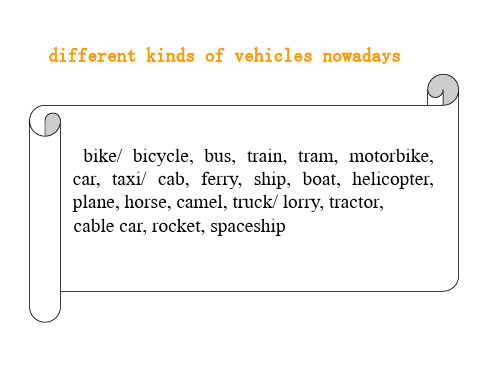
Task 3: How many parts can the passage be divided into?
Part 1 (para.1—3) About the journey. Part 2 (para.4—6) The history of Ghan train.
Journey
Alice Thompson Who? & a friend
Read the third paragraph:
sat by the During the day, she ___ looking out of it, reading window, ____________ listening to some books or _______ At night she watched cassettes. _______, shining like diamonds. the stars ______
1.Did Alice travel on the train a long time ago? No . She travelled on the train recently.
2.Was her destination on the coast of Australia? No, it was Alice Springs in the central part of Australia. 3.Was the scenery the same during the whole journey? No, at the first there were fields , then it was desert.
Useful Words & Expressions
match means refer to more than ride drive
外研版英语六年级上册Module 3 Unit 2 Period 2教案与反思牛老师

Period 2知己知彼,百战不殆。
《孙子兵法·谋攻》樱落学校曾泽平本课时为第三模块第二单元的第二课时,课本定位Unit 2 Activities 3-7。
Activity 3通过问答的方式,复习巩固用句型“—What's your hobby? —主语+is my hobby.”询问对方爱好并作答。
Activity 4为语音专项练习,让学生了解单词collect、hobby、Canada、China的重音以及句子的重读。
Activity 5通过chant和图片的方式,让学生了解不同的爱好的表达方式。
Activity 6通过看图写句子的游戏来复习巩固句型“Have you got+物品+其他?”及其答语“Yes,I have./No,I haven't”。
Activity 7通过让学生写一写自己的爱好,复习巩固重点句型“主语+is my hobby”。
知识目标1.能够感知单词collect、hobby、Canada、China的重音以及句子的重读。
2.复习巩固句型“主语+have/has got+某物”“Have you got+物品+其他?”及其答语“Yes,I have./No,I haven't”。
3.复习巩固句型“主语+is my hobby”。
4.能够两人一组完成Unit 2 Activity 3的练习。
能力目标1.能够用英语表达或询问某人是否有某物并作答。
2.能够用英语介绍自己的兴趣爱好。
3.能够积极参与小组活动,积极发言。
情感目标1.使学生体验学习、参与、合作和交际的乐趣。
2.让学生培养健康的兴趣爱好。
教学重点感知单词collect、hobby、Canada、China的重音以及句子的重读。
教师可以通过让学生听录音并跟读、教师教读并随机邀请学生朗读单词或句子的方式来突破教学重点。
教学难点本课时所学句型在实际情景中的运用。
教师采取游戏互动的方式,通过不同的游戏让学生在实际情景中不断操练所学句型,以此来突破教学难点。
外研必修一Module 3 My First Ride on a Train导学案

Module 3 My first Ride On a TrainPeriod Two Reading and vocabulary学习目标和内容:★知识目标:词汇:abandon, spend, scenery, allow, supply, shoot的用法。
短语: be short for, not…any more, in the middle of, look out of, at midnight★能力目标:学习在澳大利亚乘火车旅游的短文,训练速读、略读和查读技能。
★情感目标:了解世界各地不同的旅游文化。
课前预习案使用说明及学法指导:·先熟读P114单词列表中标注了(22)和(23)的单词,然后通读文章勾画出重点单词和短语,再完成预习案设置的问题,依据发现的问题,然后再读教材或查阅字典,解决问题。
(完成时间15分钟)。
1、查阅单词表和字典,将课本P22 Activity2 方框中单词的汉语含义标注在单词下方,然后完成方框下的选词填空。
1). an area of land where it is always dry _______________.2). valuable stones ___________.3). people who travel on a train, bus or plane ____________.4). you find this on beaches ______________.5). white or grey things made of water in the sky ____________.6). where plants grow ______________.2、从课文中找出下列短语、句子的英语表达。
1. 悉尼2. 澳大利亚3. 长途火车4. 上车5. 下车6. 艾利斯斯普林斯7. 我们吃的是由烹饪大师们做的美味饭菜。
.8. 我们看到了被遗弃的100年前建造的农庄。
牛津上海版Module3Unit3IntheshopPeriod2课件

3 yuan 8 yuan
8 yuan
3 yuan
2 yuan
S1: ______________, please. S2: Here you are. S1: How much is it/ are they? S2: It’s/ They’re______ yuan.
The second is Peter’s _s_w_e_e_t shop. wants a _s_m_a_ll_ packet
of _s_w_e_e_t_s . It’s ___f_iv_e_ yuan.
The third is Alice’s _b_r_e_ad_ and c_a_k_e shop. wants _a__lo_a_f _of
Notice
The school food shops will open tomorrow(明天). Let’s get ready for the sale(义卖). See you on the playground. Have a good time there.
Rainbow Primary School
_b_re_a_d_. It’s __t_e_n__ yuan.
wants _t_h_r_e_e chocolate cakes.
They’re __fi_ft_e_e_nyuan.
What a fun day!
_____ Shop
: Welcome to my ___ shop. Can I help you?
AA:: AA slamrgael/lspmaaclkle_t_o_f_s_wofe_e_t_s_, _p,lepalesea.se.
(沪教牛津版)五年级英语上册教案Module3Unit2(1)

沪教牛津版五年级上册英语Module 3 Places and activitiesUnit 2 Let's go shopping!第一教时(1st Period)一、主要新授内容(MAIN NEW CONTENTS)Look and learn: ninety, eighty, fifty, sixty, seventy, note, moneyHow much money have you got? I’ve got… Yuan(dollars, pounds).二、学习目标(LEARNING OBJECTIVES)1.学生能运用一百以内的数字表达物品的价格。
2.学生能够运用How much money have you got? I’ve got… Yuan(dollars, pounds).进行提问并做出正确的回答;3.学生能够根据实际情景,灵活运用所学单词及句型;4.学生能够了解并表达不同国家的货币。
三、活动介绍(ACTIVITIES)(一)任务前期准备(PRE-TASK PREPARATION)借助媒体,通过媒体儿歌或角色扮演、师生间的交流,创设真实的情境,让学生能快速的进入学习状态,也为后面新知的引出打下伏笔。
Activity 1 Asking and answering.1.教学辅助(Aids)1)电脑录像(5A-M3-U2-P1-1)2)屏幕Activity 2 Role playing.1.教学辅助(Aids)1)电脑录像(5A-M3-U2-P1-2)2)屏幕3)图片(二)任务实施过程(WHILE-TASK PROCEDURE)1.新知识的引入(PRESETATION)学生通过观看含有新授对话的录像,对所要学习的知识进行视听上的感知。
Activity 1 Watching the video1.教学辅助(Aids)录像(5A-M3-U2-P1-3)2.活动过程(Process)Activity 2 Looking at the pictures 1.教学辅助(Aids)1)多媒体(5A-M3-U2-P1-4 )2)图片2.新知识的操练(PRACTICE )1) 机械性操练(MECHANICAL PRACTICE )学生通过模仿、竞赛、儿歌等形式的仿说活动来操练句型,做到语音语调基本正确,并能理解其的含义。
Module3 My First Ride on a Train教案
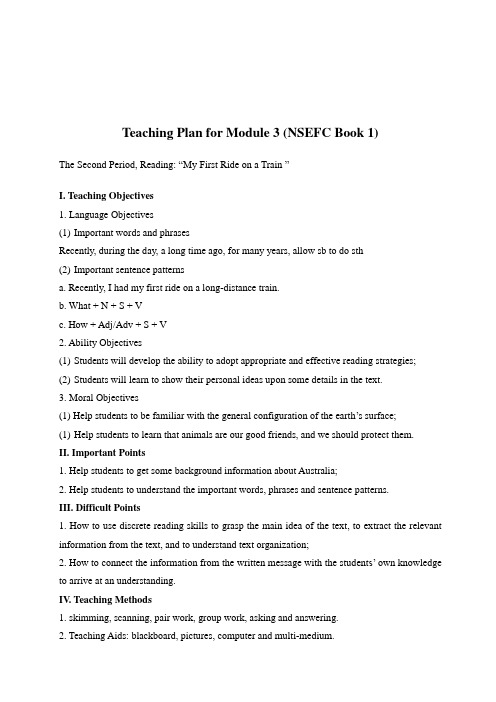
Teaching Plan for Module 3 (NSEFC Book 1)The Second Period, Reading: “My First Ride on a Train ”I. Teaching Objectives1. Language Objectives(1)Important words and phrasesRecently, during the day, a long time ago, for many years, allow sb to do sth(2)Important sentence patternsa. Recently, I had my first ride on a long-distance train.b. What + N + S + Vc. How + Adj/Adv + S + V2. Ability Objectives(1)Students will develop the ability to adopt appropriate and effective reading strategies;(2)Students will learn to show their personal ideas upon some details in the text.3. Moral Objectives(1) Help students to be familiar with the general configuration of the earth’s surface;(1)Help students to learn that animals are our good friends, and we should protect them.II. Important Points1. Help students to get some background information about Australia;2. Help students to understand the important words, phrases and sentence patterns.III. Difficult Points1. How to use discrete reading skills to grasp the main idea of the text, to extract the relevant information from the text, and to understand text organization;2. How to connect the information from the written message with the student s’ own knowledge to arrive at an understanding.IV. Teaching Methods1. skimming, scanning, pair work, group work, asking and answering.2. Teaching Aids: blackboard, pictures, computer and multi-medium.V. Teaching ProceduresStep I Greetings (1 min)Greet the whole class as usual.Step II Lead-in and Activity1 (6 mins)Show some pictures to the students and introduce the general information about Australia.T: Please look at here. Where do you think the pictures are taken?Ss: Australia.T: You’re so clever. What is Australia famous for?S: Kangaroo and koala bear.T: Right. (Write the words on the blackboard) Just now you mentioned the animals, do you know any other animals in Australia?S: …T: Yes, we can also see duck-billed platypus, possums and dingoes there. (show the pictures to them) Do you know any buildings in Australia?S: I know Sydney Opera.T: Good! Sydney Opera is famous in the world. Now I have a question: Is Sydney the capital city of Australia?Ss: No.T: Then, what’s the capital city?Ss: Canberra.T: Super! Canberra is the capital city of Australia, and Sydney is the biggest city there. Please keep this in mind. Now, look at the map of Australia. Where do you think most of the people live, in the central part of the country or on the coast?S: They live on the coast.T: You figured that out fast. From the map, you can find that most people live on the east/southeast coast. Much of the central and western part of the country is uninhabitable, why? Ss: Because the centre and west is arid desert and semi-desert.T: That’s right. Australia is the 6th largest country in the world, but has a relatively small population. Only about 20 million people there. Now, I’m sure you’ve had a general idea about Australia. Please go through the five questions in Activety1 to review what we talked about just now, and exchange the answers with your partner.Step III Pre-reading (2 mins)T: Now please look at the map again. If you live in Sydney, and you want to pay a visit to AliceSprings, how can you get there? By train or by plane? Give me the reason.S: I’ll take a train there, because it’s cheap.S: I’ll take a plane there, because it’s fast.Step IV Skimming and Scanning (8 mins)T: Different people hold different ideas. Let’s see what is Alice’s choice. Please read the text quickly, and focus on the information about“who, where, when, what, how”.T: (3 minutes later) Finished? Who did the text talk about?S: Alice Thompson and her friends.T: Yes. Where did they go?S: Alice Springs.T: Good. When did they go?S: Recently.T: Right. How did they get there?S: They took the Ghan train.T: Exactly! We can find all the answers in paragraph one, right? So what is paragraph one about?S: It tells us the general information about the writer and her train takes.T: That’s it! What did they see and do on the train?S: They saw colorful scenery and abandoned farms. They met different people on the train. S: They ate great meals. Alice talked to the passengers, read books and studied.T: Very good! You can find the answers in paragraph two and three. Then can you tell me what are the two paragraphs about?S: What did Alice and her friend see and do on the train.T: You’ve just about mastered it. How about the last three paragraphs? What can you learn from them?S: I got some information about the Ghan train.T: Good for you. Ghan is short for Afghanistan, right? And we can also know the fate of the camels. Now the structure of this text is clear. Who can tell us your understanding?S: Paragraph one is the first part. Paragraph two and three is the second part. The last three paragraphs is the third part.T: Perfect! Look at the four choices above the title. Can you tell me what’s the passage about? Ss: Travelling to the central part of Australia.Step V Careful Reading (15 mins)T: Wonderful! That’s the most specific answer. Now please read the passage again carefully and answer the questions on page 24. If your answer is “no”, please correct it.T: (4 minutes later) OK, let’s check the answers. Did Alice travel on the train a long time ago? Was her destination on the coast of Australia?S: No. Recently Alice traveled on a long-distance train. No, her destination is Alice Springs, right in the middle of Australia.T: Yes, we can find the answer in paragraph one, right? Please pay attention to the word “recently”. It is used to relate past action. Can you find any other words or phrases in this passage that has the same function as “recently”?S: “During the day; one night, at about midnight; a long time ago; a hundred and fifty years ago; for many years; until the 1920s; in 1925;in 1935.”T: Good work! All of these sentences express action completed in the past. Except that, we also have “ last week/month/year; the other day; just now; at that time” so long so forth. Next time when you meet them, please pay attention to the sequence of tense. How was their ride? Can you find the answer in paragraph one?Ss: I don’t know.T: Please look at the next sentence: And what a ride! You can’t find the subject and predicate, right? What does it mean? Can you complete it?S: …T: The answer is “What a (beautiful) ride it was!”. This is an exclamatory sentence. It is a sentence that expresses astonishment or extreme emotion. It ends with an exclamation mark. The structure is “What + N + S + V or How + Adj/Adv + S + V”. I’ll show you some examples: What a shame! How good you are! How fast she speaks! Now, can you give me any examples? S: …T: Question three and four: Was the scenery the same during the whole journey? Did she study while she was on the train?S: No, at first there were fields, then it was desert. Yes, she studied Chinese.T: Well done! How about the last two questions?S: At first, they used horses, but the horses didn’t like the hot weather. Now, they use the train. T: You’re doing a good job! What is the camel’s fate since they use the train now?S: In 1925, they passed a law which allowed people to shoot the animals if they were a problem.T: That’s great. Please find this sentence in the last paragraph. The phrase “allow sb to do sth”means: to let sb do sth. For instance: I allow you to go home now.Step VI Discussion (10 mins)T: Look at Activity 5: Discuss these questions with other students. For this part, I want you to do it after class. Now, let’s talk about the fate of the animals. It’s very cruel to make it legal to shoot the animals if they were a problem, right? Please work in groups to make a survey about the fate of the animals around you, and summarize the attitude we should take towards animals.S: …T: Yes, we have no right depriving animals of their lives. Animals are our friends, and we should protect them.Step VII Summery and Homework Assignment(3 mins)T: I want to invite someone to tell me what he or she has learnt in this class. Any volunteer? S: …T: You’re really learning a lot! Please review them after class, OK?Ss: OK!T: Your homework is to write a short passage about your first trip on a train. Class is over. Goodbye!Ss: Goodbye!VI. Blackboard Design。
最新-2021学年高中英语外研版选修六配套课件:Module 3 Period Two 精品

答案
5. regret v. n.
6. betray v. 7. considerate adj. consider v. 8. forgive v. forgiveness n. 9. loss n. 10. scold v.
后悔,悔恨; 后悔,遗憾 背叛 体贴的,考虑周到的 考虑;认为 原谅,宽恕 原谅,宽恕 损失 责备,申斥
down.
(2015·江苏)
答案
lively
(1)(教材P33)They get on very well because they both have very lively personalities and have a great interest in books. 因为她们性格都很活泼而且都对读书有兴趣,所以她们相处得十分融洽。 (2)Mr.Wang has an ability to make his class lively and interesting. 王老师有一种可以使他的课堂生动有趣的能力。 (3)The band played a lively tune. 乐队演奏了一支轻快的乐曲。
12345
答案
12345
2.Stephen and Julie started the website of Friends Reunited to B . A.make money B.know about the life of Julie’s old schoolmates C.find their lost daughter D.pass their time
[归纳拓展]
quarrel v.& n.吵架 quarrel with sb.about/over sth. have a quarrel with sb.about/over sth.
Module 3-Music-必修2-外研版-英语

Period One │ 重点难点
重点难点
重点 Ask the students to finish the questionnaire on Page 25 to talk about their likes and dislikes about music in groups. 难点 Enable the students to discuss how to listen to music.
Unit 1 │ 美文欣赏 美文欣赏
What is music? Suppose you hit a woodenIt makes a sound. Now suppose you hit a ball. It makes a sound. The second sound is called a tone (乐音). A tone is a single musical sound. Music is the art of organizing tones into meaningful patterns of sound. We might call it the language of tones. Sometimes the language of music speaks to us in tones sounding after one another in melody (旋律). Or the tones could be sounding together in harmony (协调).
Period One
Period One
Reading and speaking
Period One │ 三维目标
三维目标
Knowledge and skills (1)Get the students to learn and grasp the following important useful new words and expressions: pop(popular music)流行乐 rock(rock and roll)摇滚乐 jazz爵士乐 blues布鲁斯 classical music古典音乐 hip-hop说唱音乐 light music轻音乐
高中英语新课标外研版必修2教案(Module3Musicthe3rdPeriod)

Period 3 Listening and Vocabulary; Pronunciation整体设计教材分析In this period two parts will be dealt with. In Listening and Vocabulary part, first arouse the students to brainstorm some background knowledge about the Beatles. Then the teacher leads the students to learn some words which will appear in the interview in the way of answering the questions. Make sure the students know what they mean. And then ask the students to listen to the tape and complete the third activity. Furthermore, in order to help them know more details about the Beatles, let them listen once more and make some notes about songs as well as albums the band produced. If the students have any difficulty in understanding the interview, they can listen more times. Finally, have the students work in pairs or groups asking and answering questions to get rid of the difficult points they met during the course of listening.The second part is Pronunciation, which is an extension of the listening part and the vocabulary part and helps the students improve their listening ability. First ask the students to listen to the answers to Grammar 2 activity 4 carefully, paying attention to the intonation. Then listen to the tape again and check if they are correct. Next, do more practice by reading the sentences aloud with the correct intonation.三维目标1. 知识与技能1>Train the students'listening ability.2>Develop the students'speaking ability.3>Words: album ballad catchy complex influence lyrics solo artist tune4>Phrases: hear of split up be influenced by in the history of consist of stop doing sth. finish doing sth. break up2. 过程与方法1>Make the students know how to grasp important information through listening activities.2>Make the students catch some details of the listening material.3>Make the students master the correct intonation while reading.4>Individual work, pair work as well as group work to get every student to participate in class.3. 情感与价值1>Make it fun to grasp knowledge by listening.2>Have the students enjoy knowing more about the Beatles.3>Try to raise the students'cooperative awareness in their study by pair work or group work.教学重点1. Learn to research by cooperation.2. Learn to catch necessary information when listening.教学难点1. Lead the stude nts to take an active part in class.2. Learn to make use of correct intonations while reading and speaki ng.3. How to make the stude nts master some liste ning skills.教学过程—Step 1 Review and Lead-i nCheck the stude nts homework by ask ing them to work in pairs and compare their an swers. The n show the correct an swers on the scree n for the stude nts to refer to. If n ecessary, give some expla nati ons to help make them much clearer about some difficult poin ts.—Step 2 Liste ning1. Backgro und kno wledge(Show the followi ng questi ons on the scree n. >1>Do you know the word “ band” ?2>Does the word “ band” mean one person or more than one?3>Ca n you n ame some of the famous ban ds?4>What is your favourite band? Say why?The teacher puts the whole class into groups of four to discuss the above questi ons and work out the an swers. The n compare their an swers with other groups. Next, the stude nts refer to the correct an swers show n onthe scree n. Later, the teacher asks the whole class to look through and observe the above pictures. Fin ally, have the stude nts brain storm as much information about this world-famous musical band as possible with the help of the questions listed in the first activity on P26.2. VocabularyOptio n 1Ask the students to read the listed words as well as questions in activity two on P26 individually and try to understand what they all mean. Then ask some students to read them out and others check if they are correct. Next, let them an swer the questi ons by themselves. If they come across any problems in their understanding, they can turn to the teacher, other students or a dictionary for help. Finally, have the students refer to the correct an swers show n on the scree n after they compare their an swers in pairs.Optio n 2Hold a competition. The teacher writes any word in the table on the blackboard or shows them on the screen for the students to read. The competiti on rules are as follows:Whe n a word is give n, the stude nts who know it raise their han ds.The one that does this first reads the word and give its Chinese meaning or explains it in English. If he or she is correct, he or she will get five grades. Otherwise, he/she gets zero and another one can read and explain it again. Each student has only one chance to read the same word. The guy who gets the most grades will be the final winner.After they know what the words mean, the teacher reads the questions one by one while the whole class give the answers.Option 3Read the listed words out and let the students follow you. Meanwhile, make them pay attention to the stress of them. Put the students into pairs to practice reading them. One reads them through, while the other checks if the words are read and stressed correctly. Then exchange their roles to repeat this.Suggested answers:1>They remember it. 4>More than one.2>The words.5>They like them.3>Difficult. 6>No, they don't.3. While-listening1>Option 1The teacher asks the students to listen carefully for the first time and try to catch the main idea of the record. Then, let them look through the sen tencesi n the third activity quickly and un dersta nd their meanings completely. Later the stude nts liste n a sec ond time to decide whether the senten cesthey just read are true or false. Fin ally, in order to make the stude nts con firm their an swers are correct, you can let them liste n once more.Suggested an swers:(1>T (2>F (3>T (4>T (5>TOptio n 2(Show the following questions on the screen. >The Beatles were born in Liverpool in the north of England. During the early 1960s, the Beatles were 1> by America n rock sin gers. They had their first hit in 1962 with a 2> so ng called Love Me Do. Dur ing the mid-1960s, the Beatles gave rock music a new directi on. Mea nwhile, they sang some serious son gs, 3> as well as 4> s on gs. By thelate 1960s, the 5> ____ a nd the 6> had become more in teresti ng.After they had fini shed record ing Let It Be, they 7> . After the group had broken up, all the Beatles performed as 8> artists or started other ba nds.First the students predict what the record is mainly about. Then ask them to liste n to the tape carefully to get the main idea of the record and check if their prediction is correct. Exchange their main ideas with others. Next, play the tape one more time and the students listen carefully tocatch some details. Meanwhile, they need to fill in the blanks. Later the stude nts work in pairs to compare their an swers. At last the teacher shows the correct answers on the screen for the students to refer to or just call back an swers from the class.Suggested an swers:1>in flue need 2>catchy 3>ballads 4>complex 5>t unes 6>lyrics 7>split up 8>soloOptio n 3(Show the followi ng questi ons on the scree n. >1>Who wrote most of the son gs?2>When did they have their first hit?3>When did they tour the Un ited States?4>What was their last album?5>What did they do after the group had broke n up?6>Whe n and where did Joh n Lennon and George Harris on separately die?The stude nts are required to read them through and un dersta nd them. The n let them liste n to the tape and find out the an swers to the questi ons. Ask some stude nts to report their an swers to the class. Fi nally, check their an swers accord ing to the correct on es.Suggested an swers:1>Le nnon and McCart ney.2>In 1962.3>I n 1964 after they had become stars in their own coun try.4>Let It Be.5>After the group had broke n up, all the Beatles performed as solo artists or started other ban ds.6>Joh n Lennon died in New York in 1980 while George Harris on died in 2001.2>First, the teacher puts the stude nts into four big groups. Each one isrequired to make no tes about one special songs or album men ti oned in the fourth activity. The n the teacher plays the tape through one more time while the stude nt liste n carefully to catch as many details about these songsand albums as they can. Next, each group has a discussi on and collects the n ecessary in formatio n that members got, orga nising them in order. Fin ally, the teacher asks represe ntativesof each group to report their results to the whole class. You might as well en courage them to give differe nt opinions.Suggested an swers:Nowhere Man: seriousYesterday: balladStrawberry Fields Forever: complexLet It Be: last album.Tapescript:The Beatles were the most successful band in the history of popular music. The band consisted of John Lennon, Paul McCartney, George Harris on and Ringo Start. Starr played drums, the other three played guitar. Lennon and McCartney wrote most of the songs all the Beatles were born in Liverpool in the north of England.During the early 1960s, the Beatles were influenced by American rock singers, such as Chuck Berry and Elvis Presley. They had their first hit in 1962 with a catchy song called Love Me Do(1962>. In 1964, after they had become stars in their own country, the Beatles toured the United States andwere a huge success.During the mid-1960s, the Beatles were one of the bands which gave rock music a new direction. Some of their songs were quite serious, such as Nowhere Man; there were ballads such as Yesterday and more complex songs such as Strawberry Fields Forever.By the late 1960s, their music had changed completely. They had stopped writing simple songs with catchy tunes. The tunes and the lyrics had become more interesting and they had begun to use new instruments, too. For example, after visiting India, they started using Indian instruments.Some of their albums changed pop music completely. Their last album was Let It Be in 1970.After they had finished recording Let It Be, they split up. By the time they stopped working together, they had sold more albums than any other band in history. After the group had broken up, all the Beatles performed as solo artists or started other bands.Joh n Lennon died in New York in 1980, George Harris on died in 2001.—Step 3 Pronun ciati onFirst let the stude nts work in pairs and read through the sen ten ces in Grammar 2 activity 4. Meanwhile, mark ' when they think the voice should rise and 亠when it should fall. Then the students listen to the tape and check whether their marks are correct. If not, correct them .In order to consolidate what they just learnt, ask the students to read the sentences once aga in andpay special atte nti on to the inton ati on. Or you can choose some other senten ces and have the stude nts read them and marlas well as * where n ecessary.Suggested an swers:1>Unfortunately 呻,he arrived at the show呻after I had left * .2>By the time we arrived at the stadium ”, the band had begun playi ng3>Fortunately刀,the power cut happened • after the fans had left the stadium *.4>Before he made his latest album , he had recorded some songs with Paul McCartney *.—Step 4 Relative Language Points in This Period1. complex adj.合成的,复杂的,综合的,难解的n.复杂,合成物a complex sentence复合句a complex nu mber数> 复数a complex situati on错综复杂的形势a complex argument/problem/subjec复杂难懂的论证/问题/科目alaboratory complex 综合实验室a sports complex综合体育馆have a complex about sth对 .. 过分敏感或担忧a complex of...很多复杂的.....There is a complex n etwork of roads round the city.城市周围有复杂的公路网。
Module 3Adventure+in+Literature+and+the+Cinema教案
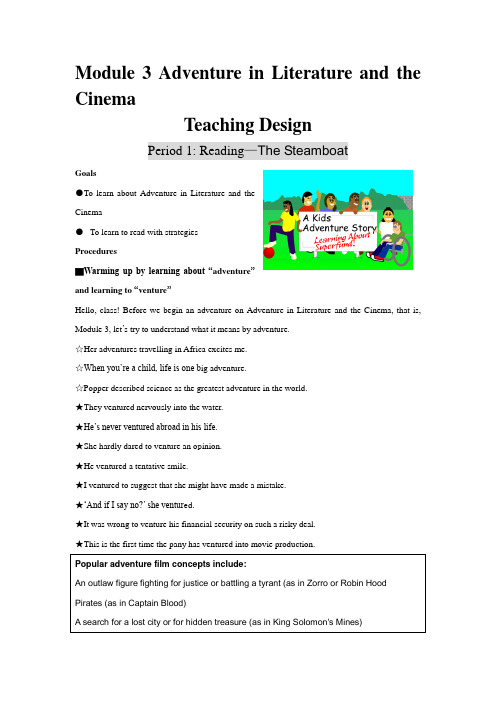
Module 3 Adventure in Literature and the CinemaTeaching DesignPeriod 1: Reading—The SteamboatGoals●To learn about Adventure in Literature and theCinema●To learn to read with strategiesProcedures▇Warming up by learning about “adventure”and learning to “venture”Hello, class! Before we begin an adventure on Adventure in Literature and the Cinema, that is, Module 3, let’s try to understand what it means by adventure.☆Her adventures travelling in Africa excites me.☆When you’re a child, life is one b ig adventure.☆Popper described science as the greatest adventure in the world.★They ventured nervously into the water.★He’s never ventured abroad in his life.★She hardly dared to venture an o p inion.★He ventured a tentative smile.★I ventured to suggest that she might have made a mistake.★‘And if I say no?’ she ventur e d.★It was wrong to venture his financial security on such a risky deal.★This is the first time the pany has ventured into movie production.■Warming up by imaging going on an adventureBoys and girls, what is adventure?Adventure is an exciting trip. If you are bored, you couldimagine going on a great adventure.Have a go at caving, climbing, sailing and canoeing atAdventure Club during the summer vocation.All the activities at Adventure Club are run and supervised byqualified and experienced staffAdventure Club started life in the 1970s as a sailing club foryoung people. Since this time it has grown and grown.Adventure Club now provides over 10,000 sessions of adventure to young people each year. Would you like to go? Then e with me!▇Before you readPlease go over the word list for this module, paying attention to the pronunciation of the word, the relationship between its pronunciation and its spelling.▇While you readCut/ the sentences into thought groups, blacken the predicates, underline the useful expressions and darken the connectives.▇After you readCopy all the useful expressions into your Expression Book and make your own sentences with them.■Read to transfer informationYou are to read the text once again to plete the table with necessary information from it.■Closing down by learning about steamboatsA steamboat or steamship, sometimes called a steamer, is a boat or vessel that is propelled by steam power driving a propeller or paddlewheel. The term steamboat is usually used to refer to smaller steam-powered boats working on lakes and rivers, particularly riverboats in the USA; steamship generally refers to steam powered shipscapable of carrying a (ship's) boat. Nuclearpowered ships and submarines use steam todrive turbines, but are not referred to assteamships or steamboats.Screw-driven steamships generally carry the ship prefix "SS" before their names, or "TS" where powered by a steam turbine. Paddle steamers have the prefix "PS". The term steamer is occasionally used, out of nostalgia, for diesel motor driven vessels, prefix "MV".Period 2: Grammar—Review of verb forms (3)Goals●To review ~ing form, the ~ed form and to + infinitive; link verbsProcedures▇Review ~ing form, the ~ed form and to + infinitive; link verbsIt is very mon to use strings of verbs - where two verbs are used in sequence. For example, the verb want is monly used in this way:I want to go home.verb 1 verb 2Only the first verb in the string is finite (has tense and subject-verb agreement). Thesecond verb must be in a non-finite form, and this can be difficult for learners as there is more than one non-finite form of the verb which can be used. monly the form used is to + infinitive, as in the example above. However, there are some mon verbs which require the -ing (present participle) form of the verb to be used in the second verb, instead of the base form. For example, the verb enjoy is monly used in this way:She enjoys dancing.verb 1 verb 2There are also some verbs such as stop which can be used in both patterns, but with different meanings. (we shall study these in the next lesson).Here is a list of some of the mon verbs used only in the pattern:verb 1 (finite) + verb 2 (-ing form)Verbs followed by the -ing formHere is a list of some of the mon verbs used only in the pattern:verb 1 (finite) + verb 2 (to + infinitive)Verbs followed by to + infinitive■Exercise: -ing or to + infinitive?In this exercise you select which is the best form of the verb to use - the -ing form or to + infinitive..1. Hello John. Fancy (to meet/ meeting) you here.2. Hello John. I didn't expect (finding/ to find) you here.3. I haven't decided (accepting/ to accept) the job yet. I want (knowing/ to know) a bit more about it.4. The students seemed (understanding/ to understand) but I'm not sure if they did.5. You must practise (to speak/ speaking) English as much as you can, and don't miss (to go/ going ) to the lessons.6. He admitted (to break in/ breaking in) to the house, but denied (to kill/ killing) the occupant.7. Don't keep (to tap/ tapping) your fingers on the table - it's very annoying.8. He decided (postponing/ to postpone) the visit again, but if he puts off (to visit/ visiting) us much longer then I'm (to go/ going) to cancel the deal.9. You have to learn (using/ to use) these difficult verbs.10. When she wouldn't agree (marrying/ to marry) him he threatened (mitting/ to mit) suicide.11. They suggested (to go/ going) to a Chinese restaurant but he wanted (eating/ to eat) Western food.12. There is a very delicious fish which people like (eating/ to eat) even though they risk (to get/ getting) poisoned.13. Everyone remended (to stay/ staying) in that hotel but it was full. But we managed (finding/ to find) a nice room in a hotel nearby.14. They don't permit (to smoke/ smoking) on the ferry although passengers tend (ignoring/ to ignore) the rule.15. She missed (to pass/ passing) the oral test by only 2 marks, although she hopes to (making up/ make up) the difference in the writing.(Keys: 1. meeting 2. to find 3. to accept, to know 4. to understand 5. speaking, going 6. breaking in, killing 7. tapping 8. to postpone, visiting, going 9. to use 10. to marry, to mit 11. going, to eat 12. to eat, getting 13. staying, to find, 14. smoking, to ignore 15. passing, make up)Period 3: SpeakingGoalsTo tell the class what film you would like to see, and why●Procedures▇Warming up by learning about what is filmHello, class. Today we shall talk about film. I know that you are all fond of films, but what do you know about them?Film is a term that enpasses motion pictures as individual projects, as well as the field in general. The origin of the name es from the fact that photographic film (also called filmstock) has historically been the primary medium for recording and displaying motion pictures. Many other terms exist — motion pictures (or just pictures), the silver screen, photoplays, the cinema, picture shows, flicks — and most monly movies."Film" refers to the celluloid media on which movies are printed. Films are produced by recording actual people and objects with cameras, or by creating them using animation techniques and/or special effects. They prise a series of individual frames, but when these images are shown rapidly in succession, the illusion of motion is given to the viewer. Flickering between frames is not seen due to an effect known as persistence of vision —whereby the eye retains a visual image for a fraction of a second after the source has been removed. Perhaps of more relevance is what causes the perception of motion — a psychological effect identified as beta movement.Film is considered by many to be an important art form; films entertain, educate, enlighten and inspire audiences. The visual elements of cinema need no translation, giving the motion picture a universal power of munication. Any film can bee a worldwide attraction, especially with the addition of dubbing or subtitles that translate the dialogue. Films are also artifacts created by specific cultures, which reflect those cultures, and, in turn, affect them.■Telling the class what film you would like to see, and whyA: I’d like to see United 93, because the shock and awe of the September 11 attacks arerevisited in this painstaking recreation of the last flight of one of the doomed aircraft.B: For me The King is the best film I have ever seen. A young man leaves the navy to search for a father he's never met and, upon finding him, begins a romance with his young daughter. It is interesting.C: I think the Top 10 Chinese Martial Arts Movies are worth seeing. They are the top 10 picks of Chinese martial arts movies.A: Tell us more about them, would you?C: All right. The first is The Chinese Connection. It came out in 1972. It was directed by Lo Wei and starred by Bruce Lee. I think you have heard of this great man.D: I know that it was original titled as Fist of Fury.C: You are well informed. This movie is Bruce Lee's classic. If you want to see Bruce Lee's action, this is the one.B: What about the second on the list?C: It is Enter the Dragon, shot in 1973, directed by Robert Clouse and starring Bruce Lee. This is Bruce Lee's most popular movie.D: The third one is Drunken Master, made in 1979, and directed by Yuen Woo-Ping and starring Jackie Chan.C: That is the movie which made Jackie Chan a star. It is an entertaining film, yet not too violent.E: What do you think of The Shaolin Temple?C I like it. It is the fourth on the list, and made in 1982. It is directed by Chang Hsin-Yen and starring Jet Li. This is Jet Li's first film. Jet Li was the all-round wushu champion (martial arts) at that time (about 1982). Thus if you want to see the real thing, just see Jet Li in this movie.A: I like the fifth one called Snake in the Monkey's Shadow. It was made in 1982, and directed by Sum Cheung and starring John Chang. I think it is the best martial arts movie on the monkey style, snake style, and drunken style.C: I like No. 6. It is Shaolin Master Killer. It turned out in 1983. And it is directed by Lau Kar-Leung and starring Gordon Liu. I have seen it three times because it is, as by Movie Summary, "One of the most revered martial arts films of all time, this is the story of ayoung man who joins the Shaolin Temple when the Manchus kill his family."E: Chinese Martial Arts Movies are my favorites, too. I like to see Supercop once again. It seems to be the seventh on the list of the Top Ten Chinese Martial Arts Movies. It was first shown in 1992. And I believe it is directed by Stanley Tong and starring Jackie Chan, Michelle Yeoh. The film displays Chan's dual mastery of physical edy and martial arts while also showcasing his notorious predilection for handling his own stunts."A: I think Fist of Legend is good, too. It came out in 1994, and was directed by Gordon Chan and starring Jet Li. It is said that Fist of Legend is the best movie by Jet Li. This is a remake of Bruce Lee's The Chinese Connection.C: We are really fans of martial arts movies. Let’s go and see them after school!■Reading about Master and manderPlot Summary for Master and mander: The Far Side of the World(2003)During the Napoleonic Wars, a British frigate, HMS Surprise, and amuch larger French warship, the Acheron, with greater fire power, stalkeach other off of the coast of South America. Russell Crowe brings greatintensity to the role of Captain Jack Aubrey. Lucky Jack, as he is referred to by his crew, is well regarded by his men, who trust him implicitly, even after the first devastating battle and an apparent personal vendetta against the French captain. While the naval battle sequences are quite fantastic, the film is successful because director Weir chose to build the story to get to know the men who are locked aboard the tight quarters of a small ship and how they interact everyday. The officers and the mates are well-known by the time the final battle es. Paul Bettany offers a strong performance as the surgeon and naturalist who balances the violence of his chosen life with the quiet demeanor of the scientist. He is the captain's friend and confidant, the two frequently playing violin and cello duets together. The horrors of the injuries from the war are frequently implied, but vividly depicted in the reactions of the characters.■Closing down by retelling the story of Master and manderDuring the Napoleonic Wars, Lucky Jack Aubrey captains the crew of his H.M.S. Surprise. When the ship is suddenly attacked by a superior enemy, it is badly damaged and much of his crew is injured. In a bold and dangerous move, Aubrey decides to set sail in a high stakes chase across two oceans to intercept and capture their foe. It's a mission that can decide the fate of a nation--or destroy Lucky Jack and his crew.Period 4: FUNCTION—Reporting statements and suggestionsGoalsTo learn to report statements and suggestionsProcedures▇Warming up by learning about r eported speech - indirect speechIndirect Speech (also referred to as 'reported speech') refers to a sentence reporting what someone has said. It is almost always used inspoken English.He said, "I live in Paris." He said he lived in Paris.He said, "I am cookingdinner."He said he was cooking dinner.He said, "I have visted London twice."He said he had visited London twice.He said, "I went to New York last week."He said he had gone to New York the week before.He said, "I had alreadyeaten."He said he had already eaten.He said, "I am going to find a new job."He said he was going to find a new job.He said, "I will give Jack acall."He said he would give Jack a call.■municating with direct and indirect speech●If the reporting verb (i.e. said) is in the past, the reported clause will be in a past form. This form is usually one step back into the past from the original.For example:He said the test was difficult.She said she watched TV every day.Jack said he came to school every day.●If simple present, present perfect or the future is used in the reporting verb (i.e. says) the tense is retained.For example:He says the test is difficult.She has said that she watches TV every day.Jack will say that he es to school every day.●If reporting a general truth the present tense will be retained.For example:The teacher said that phrasal verbs are very important.●Changing Pronouns and Time SignifiersWhen changing from direct speech to indirect speech, it is often necessary to change the pronouns to match the subject of the sentence.For example:She said, "I want to bring my children." BEES She said she wanted to bring her children.Jack said, "My wife went with me to the show." BEES Jack said his wife had gone with him to the show.●It is also important to change time words (signifiers) when referring to present, past or future time to match the moment of speaking.For example:She said, "I want to bring my children tomorrow." BEES She said shewanted to bring her children the next day.Jack said, "My wife went with me to the show yesterday." BEES Jack said his wife had gone with him to the show the day before.●Indirect QuestionsWhen reporting questions, it is especially important to pay attentionto sentence order. When reporting yes/ no questions connect the reported question using 'if'. When reporting questions using question words (why, where, when, etc.) use the question word.For example:She asked, "Do you want to e with me?" BEES She asked me if I wanted to e with her.Dave asked, "Where did you go last weekend?" BEES Dave asked me where I had gone the previous weekend.He asked, "Why are you studying English?" BEES She asked me whyI was studying English.■Closing down by making a summary of Reporting statements and suggestionsVERB TENSEWH- QUESTIONCHANGEPRESENT PASTMy friend "How are you?" My friend asked how Isaid, was.PRESENTPROGRESSIVEPAST PROGRESSIVEMy friend said,"Where are yougoing?"My friend asked whereI was going.PAST PAST PERFECTMy friendsaid, " Whom did you call?"My friend asked whomI had called.PAST PROGRESSVEPAST PERFECTPROGRESSVEMy friend said," Whom I wascalling?"My friend asked whomI had been calling.PRESENT PERFECT PAST PERFECTMy friend said," Where have youbeen?"My friend asked whereI had been.PRESENT PERFECTPROGRESSVEPAST PERFECTPROGRESSVEMy friend said," How have you beendoing?"My friend asked how Ihad been doing.PRESENT - GENERAL TRUTHPRESENT - GENERAL TRUTHMy friendsaid, "Where is Venus?"My friend asked whereVenus is.Period 5: WritingGoals●To learn to read and write summaries of filmsProcedures▇Warming up by glancing over The Adventures of Huckleberry Finn哈克贝里·芬历险记第01章教哈克学文明规矩——华珍小姐——汤姆·索亚在等候第02章两个孩子逃过了杰姆的搜寻——汤姆·索亚的帮伙——精心作出的计划第03章全身查看了一遍——主日得胜——“汤姆·索亚的一次谎话”第04章哈克与法官——迷信第05章哈克的父亲——好父亲——改造第06章他控告法官撒切尔——哈克决定要出走——政治经济学言论——折腾第07章守候着他——给锁在木屋里——把尸体沉下去——歇息第08章睡在林子里——打捞起死者——察勘全岛——发现了杰姆——杰姆的出逃——预兆第09章山洞——漂流的屋子第10章发现——“老汉克·朋格”——男扮女装第11章哈克和村妇——搜捕——支吾搪塞——去高申第12章缓慢的航行——借东西——上破船——歹徒——搜寻小船第13章逃出破船——守夜人——沉没第14章快活的时光——后宫——法语第15章哈克丢了木筏子——雾中——哈克找回了木筏子——垃圾第16章期待——一次没有恶意的谎话——漂来的钱财——错过开罗——往岸边游去第17章章黄昏时叫门——阿肯色的田庄——室内陈设——斯蒂芬·道林·博茨——诗兴第18章格伦基福特上校——贵族门第——打冤家——《新约全书》——收回了木筏子第19章白天停靠——一个天文学说——重振戒酒运动——勃里奇华特公爵——王室遭难第20章哈克作解释——策划一次战役——到野营会上施展一番——野营会上的一名海盗第21章斗剑操练——哈姆雷特独白——他们在镇上四处蹓跶——一个懒散的市镇第22章歇朋——看马戏——在马戏场里发酒疯——惊心动魄的悲剧第23章上当——拿国王跟国王比——杰姆想家心切第24章披了王袍的杰姆——他们收了个乘客——打听情况——一家人的悲痛第25章“是他们么?”——唱颂歌——光明正大——殡葬酒宴——投错了资第26章一位虔诚的国王——国王的教士——她向他赔不是——在房间里躲起来第27章葬仪——满足好奇心——对哈克起了疑心——薄利快销第28章准备去英国——“这畜牲”——玛丽·珍妮决计离家——哈克分别玛丽·珍妮第29章争当家属——国王对丢钱作了解释——笔迹问题——把尸体从墓中挖出来第30章国王和他闹开了——国王勃然大怒——烂醉如泥第31章凶险的策划——来自杰姆的消息——回忆往事——一头羊的故事——宝贵的信息第32章静悄悄象过星期天一般——认错了人——露马脚——进退两难。
高中外研版英语必修一课时作业:Module 3 Period Two
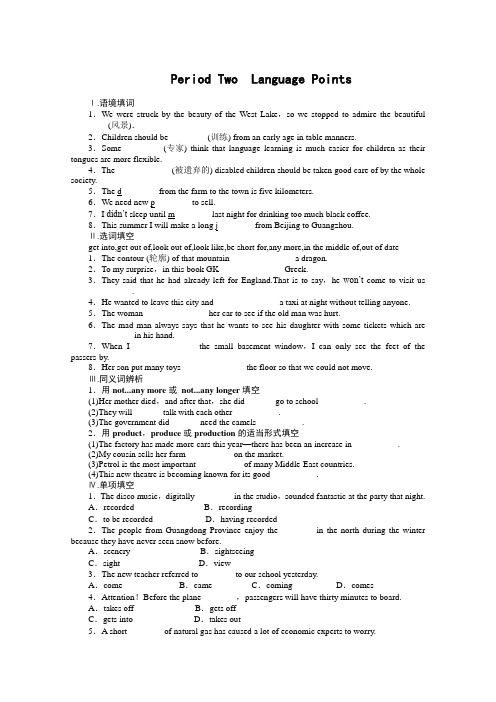
Period Two Language PointsⅠ.语境填词1.We were struck by the beauty of the West Lake,so we stopped to admire the beautiful ________ (风景).2.Children should be ________ (训练) from an early age in table manners.3.Some ________ (专家) think that language learning is much easier for children as their tongues are more flexible.4.The ____________ (被遗弃的) disabled children should be taken good care of by the whole society.5.The d________ from the farm to the town is five kilometers.6.We need new p________ to sell.7.I didn’t sleep until m________ last night for drinking too much black coffee.8.This summer I will make a long j________ from Beijing to Guangzhou.Ⅱ.选词填空get into,get out of,look out of,look like,be short for,any more,in the middle of,out of date1.The contour (轮廓) of that mountain ______________ a dragon.2.To my surprise,in this book GK ______________ Greek.3.They said that he had already left for England.That is to say,he won’t come to visit us ______________.4.He wanted to leave this city and ______________ a taxi at night without telling anyone.5.The woman ______________ her car to see if the old man was hurt.6.The mad man always says that he wants to see his daughter with some tickets which are ______________ in his hand.7.When I ______________ the small basement window,I can only see the feet of the passers-by.8.Her son put many toys ______________ the floor so that we could not move.Ⅲ.同义词辨析1.用not...any more或not...any longer填空(1)Her mother died,and after that,she did ______ go to school __________.(2)They will ______ talk with each other __________.(3)The government did ______ need the camels __________.2.用product,produce或production的适当形式填空(1)The factory has made more cars this year—there has been an increase in __________.(2)My cousin sells her farm __________ on the market.(3)Petrol is the most important __________ of many Middle-East countries.(4)This new theatre is becoming known for its good __________.Ⅳ.单项填空1.The disco music,digitally ________ in the studio,sounded fantastic at the party that night.A.recorded B.recordingC.to be recorded D.having recorded2.The people from Guangdong Province enjoy the________ in the north during the winter because they have never seen snow before.A.scenery B.sightseeingC.sight D.view3.The new teacher referred to________ to our school yesterday.A.come B.came C.coming D.comes4.Attention!Before the plane________,passengers will have thirty minutes to board.A.takes off B.gets offC.gets into D.takes out5.A short________ of natural gas has caused a lot of economic experts to worry.A.supply B.useC.product D.information6.The ship happened to sink with its passengers on board 200 miles off the ________ island.A.abandoning B.abandonedC.deserting D.left7.We are not allowed________ loud in class.A.talking B.to talkC.talked D.talk8.The company is famous for the________ of small cars and its________ are well received in the market.A.product;productsB.production;productionsC.production;productsD.product;productions9.Mary got________ the bus,got________ a car and then disappeared________ the distance.A.off;on;at B.out of;into;inC.off;into;in D.out of;on;in10.TV is short________ television,while we can use km________ kilometer.A.of;instead B.for;instead ofC.of;instead of D.for;insteadⅤ.阅读理解Throughout our lives we will meet many different people.Some pass through our lives for a few seconds,while others stay longer and touch us in a special way.My friend Deddie Swaney is someone that touched my life,and the lives of many others throughout her life.She is a woman of courage,determination and kindness,and with 47 marathons under her belt,recently lost her fight against cancer at the age of 44.I first met Deddie nine years ago at work and was drawn to her kindness.Deddie was an avid (酷爱的) runner and was known around the office for her love of the sport.She soon inspired (鼓舞) me to join her by first training for a relay,later followed by a marathon.Throughout the years,she bridged many close friendships and coached many of us to our first marathons.I will never forget Deddie’s strength as she pulled me through some very long and difficult runs.No matter how cold or how early it was,she would always make time for a run and the chance to spend time with her friends.It was Deddie’s goal to run a marathon in all 50 states.She proudly finished 39 states and 11 remained unfinished.Throughout her marathons,Deddie would stop to help other runners along the way who were struggling.For Deddie,it wasn’t about the time she finished the race in,but meeting other runners throughout her journey and helping coach them to reach the finish line.Deddie was first diagnosed (诊断) with cancer almost five months ago.Although the true source of her cancer is undetermined,it is a very rare form of cancer for someone of her young age.With great determination and her 47 marathon medals,Deddie never lost her courage,hope and faith.Deddie lost her fight against cancer on July 8,2007.Deddie was more than a runner;she was also an inspiration to many and will be missed by those that she touched in her life.1.What would Deddie often do in a marathon race?A.She would stop for a rest because of her poor health.B.She would ask all her good friends to run together.C.She would stop to give a hand to those in need of help.D.She would be the last one to finish the race.2.What can we learn from Deddie in the passage?A.She was in poor health when she was born.B.She did nothing but run marathons in her life.C.She made many friends for her love of the sport.D.She achieved all her goals she had set.3.What happened to Deddie on July 8,2007?A.She came to the end of her life.B.She was found out having cancer.C.She decided to stop running forever.D.She finished her marathon in all 50 states.4.Which of the following can best describe the wri ter’s attitude towards Deddie?A.Hateful. B.Bored.C.Wondering. D.Respectful.5.The author wrote the passage in order to ________.A.tell us her best friend is a marathon runnerB.remember a running hero who died youngC.prove that anyone can be a marathon runnerD.explain courage,determination and kindness are importantsupply v.供给,供应,后面不跟双宾语。
外研版八年级英语上册Module 3 unit2 This year we are training more carefully.教案
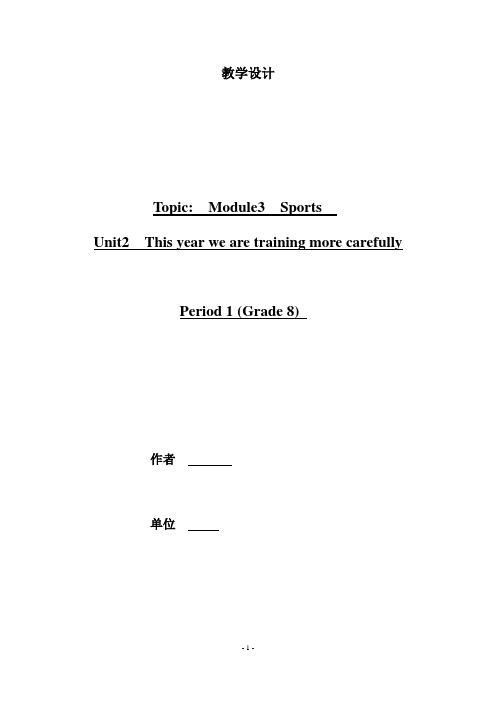
教学设计Topic: Module3 SportsUnit2 This year we are training more carefullyPeriod 1 (Grade 8)作者单位While- reading other team in the finalmatch?Q3: How do they work out(解决)the problem?(2) Check the answers andmake students knowtraining carefully andworking as a team playimportant roles in success.4. The fourth readingRead para.4 and answer thequestions:Q1:How can they havemore fans?Q2:What can the fans do?5. Think and discuss:If we want to succeed, whatshould we do according tothe passage(根据文章)?(1)Ask students to discusswith their partners and thenget a feedback.(2)Show the picture andinvite some students to fillin the blanks.answers inparagraph32.To sense thekey factors to getsuccess.Find the answersfrom the lastparagraph.1. Intake the keyfactors appearedin the passageand retell someof them and addtheir ownopinions freely.2.Summarize thewhole passageand get the keypoints tosucceed.语言来感知段落大意。
沪教版英语五年级上册三单元Unit 3 Period 2
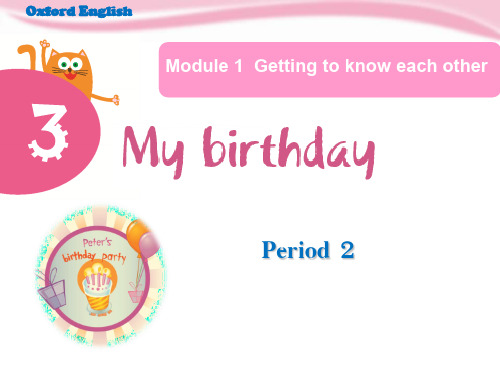
I can’t wait.
Step 4 Invite friends
Peter:My birthday is coming. Can you ______________________, Joe?
My special day is 26th September. It’s my birthday.
My special day is 26th September. It’s my birthday. I want to have a special party.
A birthday party
a birthday invitation
orange
2 26th
Place: Room …, Building … No. ..., … Road
Step 4 Invite friends
Can you bring some orange things to the party? It’s an orange party.
my home 2 p.m. a cake, food, juice, balloons
four
Step 2 Buy thinStgesp 2
orange things
o
Peter wants to have an orange party. Orange is his favourite colour. He can buy some orange things.
11th eleventh
外研版必修1高中英语Module 3 My First Ride on a Train Period two学案
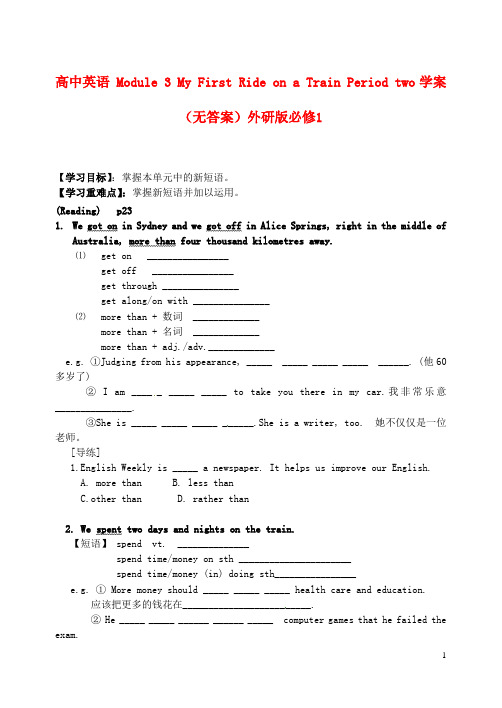
高中英语 Module 3 My First Ride on a Train Period two学案(无答案)外研版必修1【学习目标】:掌握本单元中的新短语。
【学习重难点】:掌握新短语并加以运用。
(Reading) p231.We got on in Sydney and we got off in Alice Springs, right in the middle ofAustralia, more than four thousand kilometres away.⑴ get on ________________get off ________________get through _______________get along/on with _______________⑵ more than + 数词 _____________more than + 名词 _____________more than + adj./adv._____________e.g. ①Judgin g from his appearance, _____ _____ _____ _____ ______. (他60多岁了)②I am _____ _____ _____ to take you there in my car.我非常乐意_______________.③She is _____ _____ _____ ______.She is a writer, too. 她不仅仅是一位老师。
[导练]1.English Weekly is _____ a newspaper. It helps us improve our English.A. more thanB. less thanC.other thanD. rather than2. We spent two days and nights on the train.【短语】 spend vt. ______________spend time/money on sth ______________________spend time/money (in) doing sth________________e.g. ① More money should _____ _____ _____ health care and education.应该把更多的钱花在_________________________.② He _____ _____ ______ ______ _____ computer games that he failed the exam.他花费太多的时间玩电脑游戏____________________________.It +takes+sb.+time+to d o sth.e.g.① She_____ $100 ______ ______/ ______ a new skirt.她花100美元买了一条新裙子。
Module 3 Unit 9 Period 2
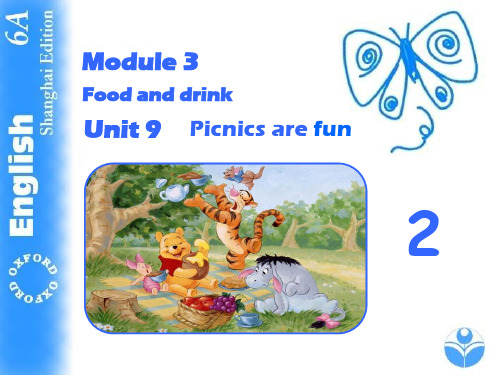
Gold Mine
Option 1 Option 2
Look, read and write
Act it out
Look, read and write
Shall we buy some cola? Why do you like ________? cola
3-1 Yes, I like ________. cola I like it because it’s __________. sweet
I like because ___________ them __________ they’re delicious. __________________________.
1 2 3
3-2 Shall ____________ we buy some fish balls? Why not? What _________ you like? would No, I don’t ______________________. like fish balls They’re too __________. salty
Let’s go to the supermarket to buy some food and drink for the picnic.
4-1
1 2 3 4
4-2 Shall we buy some apple juice? Why do you like apple juice?
I like it because it’s sweet.
1 2 3 4
4-3 Yes, I like oranges. Shall we buy some oranges?
Why do you like oranges?
Book4 Module 2 period 3
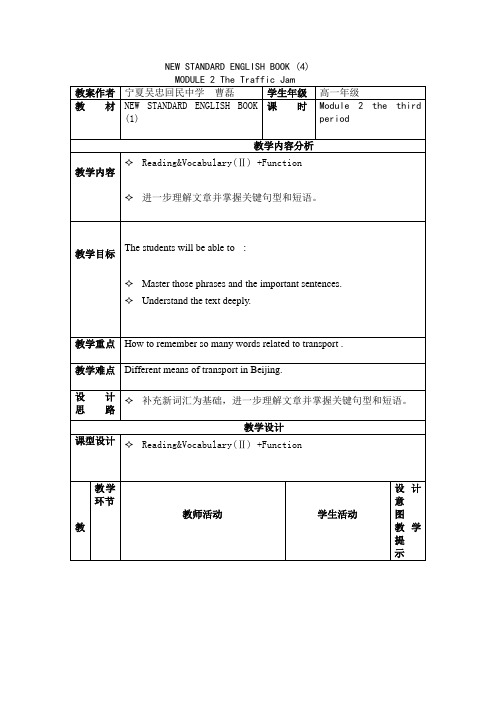
NEW STANDARD ENGLISH BOOK (4)MODULE 2 The Traffic Jam教案作者宁夏吴忠回民中学曹磊学生年级高一年级教材N EW STANDARD ENGLISH BOOK(1) 课时Module 2 the thirdperiod教学内容分析教学内容✧Reading&Vocabulary(Ⅱ) +Function✧进一步理解文章并掌握关键句型和短语。
教学目标The students will be able to :✧Master those phrases and the important sentences.✧Understand the text deeply.教学重点H ow to remember so many words related to transport .教学难点D ifferent means of transport in Beijing.设计思路✧补充新词汇为基础,进一步理解文章并掌握关键句型和短语。
教学设计课型设计✧Reading&Vocabulary(Ⅱ) +Function教教学环节教师活动学生活动设计意图教学提示学流程教学流程导入Step 1✧Check the homeworks in activity3.·show out the words game accordingto those words.·correct the answers together.Step 2 Analyze the textAsk SS to read the text one sentencesby one sentence and then ask anotherSs to translate it into Chinese.·give out the examples of eachphrases.·let’s sum up some words related totransport in the text, make sure youcan understand the meanings of thesewords.·be connected to /with·be/ get stuck in·in no time✧Correct the answerand check it.✧Make notes✧Discussion thisquestions✧Give someinformation✧Students writedown them andmake a report.知识新授·at a time·on time·get/look around·switch off/on·turn on/offStep 3 FunctionAsk the Ss to find more examples inthe text and encourage the students touse these phrases to give advice.Ask Ss to read the sentences inActivity 1 on page 13 and summarizethe ways of giving advice.You should do …Make sure you do …It’s a good idea to do …You had better do …Why not do …?Why do n’t you do …?Let’s do …What about…?How about…?Shall I / we do…?2. Ask Ss to write some advice to theirclassmates about learning English.1. You should work hard at English.2. Why don’t you buy some Englishtapes and some books to go with them3. You had better join in the EnglishCorner and speak English as often aspossible.4. Why not look for a foreign penfriend if you want to improve yourwriting?5. Make sure you listen to English andspeak it every day.Step 4 More PracticesDeal with Ex2 on page 13 in the✧Write down thosephrases andremember it.✧List out thestructure and giveout moreexamples .✧Deal with theexercise carefully.练习巩固Make a dialogue use those phrases. 总结✧板书/课件设计提示MODULE 2 The Traffic JamReading&Vocabulary(Ⅱ) +Function·be connected to /with ·at a time·on time ·get/look around ·switch off/on ·turn on/off ·be/ get stuck in ·in ni time课后作业✧Remember those phrases and dictation tomorrow.✧Preview next part教学反思。
2019-2020年高中英语Module33rdperiod优秀教案外研版必修1

2019-2020年高中英语Module 3 3rd period 优秀教案外研版必修1The General Idea of This PeriodIn this period, we' re going to learn the Ianguage points of the passage, I ' ll explain some difficult senten ces, give the usages of some useful phrases, ano ther purpose is to en able the百tiidcnt百to grasp the passage butter.Teaching Aims1. Lear n and master the follow ing words and expressi ons :abandoned, a long distanee, try doing, Ghan, Afghanistan, be short for, until the1920s ,no t...a ny Ion ger, allow sb. to do, get phrase, look out of, one ni ght, 讥I. Ki en ighl2. Tr;-iin i.上e sl.i.iderirear; i ,ig I i :.yTeaching Important Poin ts1. Ijipixivp i he s …idem i ng i I 11,-.2. Krnn'c J K: .sLudcnts io under si arid tu- text 冗Me 二3. Master the follow ing phrases :have one ' s ride on a long -(]飞1』「1〔工L'7J; 1long- di^ldiiucWhat a ride!look 1 ikeIuok out oftry Li)in^be short, fornot mtithe 1920siwt….any moreTeaching Difficult Poin tsMaster the sentence structures :1. Recently, I had my first ride on 工「尽dinii:煮l.:a'n.2. We got on in Sydney and we got off in Alice Sprin gs, ni ght in the middle of Australia,□orc than…away3. We ate great meals cooked by experts!4 Thev di du' t need The campl s anv more.Teaching Methods1. Discussi on before read ing to make stude nts in terested in traveli ng and the first rideon a train.2. I''LSI.口汕」i「电』gui i.he 和'imil i cca tjl' l.:ic- l.cxL3. mi〔.ii培L:I gc-l. sijfLC- dz.F.iWd /ll'orrnal.ion.4. LApla:ia/(jr:s J) l.hu kugLftgi: points.Teaching Aids1. a puter2. a tape recorder3. stijnc pidurusTeaching BroceduresSt.^p 1 (T rpetin^Groot the whole class usua'.Step 2Ru visionT: Yesterday we learnt some new words, now let ' s have a dictation. Please take out a pieceof paper and writ c then i“(Tli n t(?nrl:ur thn sriidcnts t.o hf-ird i n rhoir papers.)Step 3 Pre- m.d i「电T: Nowadays, travel is being more and more popular, especially, manyyoung people like travel. What about you?Please look at the questions on the screen and d i sciis-s .hwi :.A百口H川匚「『亡“chcr use th亡imiltinic?〔lid to show th亡(pu?stions on trie? scrcjoE.)1. Do you like travel? Why or why n ot?2. Where would you most like to travel? Why?3. Have you ever tried any travel on a train?(The teacher gives the stude nts five minu tes to discuss and call back the an swers from thesiudei'iLs. }Suggested answers :S: Yes, I like travel. I would most like to travel to some places of interest, to the forestor to the mountain. Because , I want to see the famous places or enjoy the beautiful scene inRcltUR ・S: I ' d like to travel to North China very much. Because I want to visit the places of greatinterest, I want to visit the universities there, such as Beijing University, and I like to takea train to enjoy the scenery on i IS 晋址.T: OK.I also like travel, last year, I went to Beijing by plane. That was my first time totravel by plane, I was very happy and excited. And two years ago, I traveled to Harbin by train.That was the first long journey with my family. It took us 3(]丨|(川"乞⑴ be CII t.Step 4 RendingT: Today, we' ll learn the text “ My First Ride on a Train ” and we' ll know something aboutit. I know you' re all in terested in it. Now, please o pci: voir al. 23. Rcac i.hcquickly, then tell me if s I.'.IP」abo.ii.,^■Slinw the possihl c oil tnc? scrcjor..}Toll the students: tn chnuso rbn bnsr. our; as soon a.s poss:'bl n.A: . i :i I i •:.B:C: . ' i . ■:1- ■ .■- i I ' I .D: a child visit ing her gran dmotherT: Look at the scree n. Li Lei, what' s your opinion?S: I think C is correct,T: Yes, very good! Thank you!An swer me a simple questi on:Q: Did Alice travel on the train a long time?S: No, slit? d\lv L.Q>: How do you know about this an swer?S: Becfibse ther^ 丄a 1L i'ecenl.1 y f, in i.he second sentence.T: Yes, you' re right, we may change it like this :Recently Alice traveled on a long- d SldNCC I 习i 11.Stop 5 Careful K D Eiding1. Play the tape again and tell the st uccril.s c^trcl'rl ly I lu-n 汕:苗烏L:z「[川脚i曙LlLIi^lifUls :(Th匕LecLcher shows Ll'iem(J:I Lhe wcreei].)1. What' s Alice ' s destination?2. Was the sce nery the same duri ng the whole journ ey?3. What did she do while she was on the train?4. What did the Australia ns use to travel to the cen tral part of the coun try?5. They don' t use camels to deliver goods now, do they?2. Ask the stude nts to liste n and read it carefully, the n ask the questi ons in pairs orindividually work.Suggested answers :1. Hur LCS'.. iiial.ion was lhe ceil..ral pari ol' AusirtiI ift.2. No,3. Shr 口用;1 刈心 cm; I isLcncd ⑴ her CHncsc C A-ISSU L I i\s 讪ik 如讥上on I4. The Aus'..ral Jt fsc-L came I s io L门ml * I l:c crnLi'M 卩订门「卄工mii.iy5. No, they don ' t.Slop 6 Language PointsT: Nowyou' ve known the main idea of the passage. Nowlisten to the tape paragraph by paragraph. Meanwhile, l'L】d ill L」H iiii[〕ci'LHi:L phrases 力诃L i I'.' ici 11. SCI J CKCC.(Afier a v/hi le.;Teacher asks three stude nts to point them out in each paragraph, teacher writes them on theb 1 cickho<i.rd.have one r s first rideon a long- i . i ;What a ride!get on get off get into get out of spe nd... on... look like more tha n :.i. . i ■ ;l ? look out of at midnight try doing be short of more than the 1920ssb. to do...1. We spe nd two days and ni ghts on the train.2. What a ride!3. We ate great meals cooked by experts!4. The Afgha ns and their camels did this un til the 1920s.5. They didn ' t need the camels any more.Step 7 Piac.lic.uT: M(m put the phrases into Cbinusc and try to nakc a suntDncc with nach of thum.(The teacher asks the stude nts to make senten ces before the class and gives the exampleson '.he screen.)1. Recently I had my first ride on a long- .:一:… ..引丁::■.」:「1“不久前,我第一次坐了长途火车。
- 1、下载文档前请自行甄别文档内容的完整性,平台不提供额外的编辑、内容补充、找答案等附加服务。
- 2、"仅部分预览"的文档,不可在线预览部分如存在完整性等问题,可反馈申请退款(可完整预览的文档不适用该条件!)。
- 3、如文档侵犯您的权益,请联系客服反馈,我们会尽快为您处理(人工客服工作时间:9:00-18:30)。
Ⅰ.单词识记
1.________n.脚踝 2.________vt.凝视 3.________vt.擦;抹;揩 4.________n.宗教
课前自主学习
课堂互动探究
2.stare v.凝视;盯着看 It's bad manners to stare at others.
盯着别人看是不礼貌的。 He sat there,staring into space.
他坐在那儿,凝视着太空。
课前自主学习
课堂互动探究
【归纳拓展】
辨析: glare/stare/glance (1) glare指“怒视”,强调敌对或威胁的态度,与at连用。 They stood glaring at each other. 他们站着互相怒目而视。 (2)stare指“睁大眼睛出神地看,注视,瞪视”,这种注视 出于惊讶、好奇、羡慕、恐惧,有时是粗鲁无礼,与at连 用。 The little boy stared at the stranger for a few minutes before answering his questions. 这个小男孩惊讶地睁大眼睛望着那个陌生人好几分钟才回 答他的问题。 (3)glance指“瞥视,匆匆一看”,与at连用。
别担心。你的请求能够获准。 (2)vt.请求,要求 He requested that I (should) go there. 他恳求我前往那里。 I request your presence at my birthday party. 敬请参加我的生日宴会。
课前自主学习 课堂互动探究
【归纳拓展】
bend forward/backward前倾/后仰
课前自主学习 课堂互动探究
【完成句子】 ①你能不屈膝就够到脚趾吗?
Can you touch your toes without ___________________?
②她不得不前倾才听得见那男孩子说的话。 She had to ________to hear what the boy was saying. ③他俯身去系鞋带。 He ________to do up his shoes. 答案 ①bending your knees ②bend forward ③bent down
课前自主学习
课堂互动探究
【单项填空】
This town is so called just________a hero in the AntiJapanese
War named Zhao Shangzhi. A.in favour of B.in honour of
C.in face of
解析
D.in need of
even by accident. 在泰国,你不可以摸别人的头,即使是偶然的也不行。
[信息提取]
[例句仿写] 答案
mustn't是情态动词must的否定形式,意为“
不许你那样和你的父母说话。
禁止;不允许”。 You ______________________like that. mustn't speak to your parents
句意:这个镇子这么叫就是为了纪念抗日战争中的一
个叫赵尚志的英雄。故正确答案应为 B 。 in favour of 意为 “赞成,支持”;in honour of意为“出于对某人的敬意”; in face of意为“面对”;in need of意为“需要”。
答案
B
课前自主学习
课堂互动探究
1.lift up举起,提起;提高;鼓舞 He lifted up the box and put it in the truck.
课前自主学习
课堂互动探究
Ⅲ.句型搜索 1.In France you should shake hands every time you say hello and goodbye. 在法国,每次见面或道别时都要握手。 [信息提取] every time意为“每次”,用作连词,引导时间 每次他来,都会给我带一本书。
其中的should可以省略。
课前自主学习
课堂互动探究
4.favour n.恩惠;善意的行为;支持;偏爱,偏袒 Could you do me a favour to pass me the book? 请帮忙把那本书给我递过来好吗? This is the first favour I have ever asked of you. 这是我第一次请你帮忙。
off寄出;send up发射,为及物动词短语。故答案为A。 答案 A
课前自主学习
课堂互动探究
2.up and down一上一下地;前前后后;来来往往 The boy walked up and down the stone steps. 那个男孩在那段石阶上走来走去。 In the street,cars are busy rushing up and down.
课前自主学习 课堂互动探究
【单项填空】 Every day before our class, our headteacher always ________us to see if anyone is absent from the class. A.glares at C.looks at B.stares at D.glances at
形”,should可省去)
课前自主学习
课堂互动探究
【单项填空】
①I'm sorry that I cannot accept your________to attend your
birthday party,because I'm________to answer all the customers' letters tonight by my boss. A.requirement;required B.demand;requested
状语从句。
[例句仿写] 答案 __________________________,he will bring me a book. Every time he comes to see me
课前自主学习
课堂互动探究
2.In Thailand you mustn't touch someone on the head,
解析
答案
句意:每天上课前,我们班主任都会扫视一下看是
D
否有人缺课。glance at“扫视,匆匆一看”,符合句意。
课前自主学习
课堂互动探究
3.request (1)n.请求,要求 Tom made a request that I should help him. 汤姆要求我帮助他。
Don't worry.Your request will be granted.
他举起箱子把它放在卡车里。
She lifted the box up and rushed out of the office. 她提起箱子,冲出了办公室。
Lift up your voice and you can make yourself heard.
提高你的声音,这样你的话就会被听到了。 【归纳拓展】 lift (sb/sth) up(将某人/某物)举起;抬起 lift off发射;升空 lift (up) one's eyes抬眼看
课前自主学习 课堂互动探究
【单项填空】 The________into the sky.
A.lifted off
C.sent off 解析
B.lifted up
D.sent up
句意:当火箭发射到空中时突然冒出一团火焰。
lift off表示“发射”,为不及物动词短语。lift up举起;send
5.________n.恩惠;善意的行为
6.request n.________
课前自主学习 课堂互动探究
7.invitation n.________ 8.panic v.________ 9.toast n.________ 10.rude adj.________ 答案 1.ankle 2.stare 7.邀请 3.wipe 4.religion 5.favour 9.祝酒;干杯 6.请求;要求 8.恐慌;惊慌
10.粗鲁的;无礼的
课前自主学习
课堂互动探究
Ⅱ.短语天地
1.________举起
2.________一上一下地 3.________偶然地 4.________向……问好 5.ask sb a favour________
6.enjoy oneself________
答案 1.lift up 2.up and down 3.by accident 4.say hello to 5.请某人帮忙 6.过得快乐,玩得愉快
在大街上,车辆急速地来来往往。
【拓展】
back and forth前前后后
backwards and forwards来回地 from side to side从一边到另一边;左右(摇摆)
课前自主学习
课堂互动探究
【翻译句子】 那位老师在教室里踱来踱去,胳膊下面夹着一本书。
__________________________________________________
课前自主学习
课堂互动探究
1.bend v.弯曲;使弯曲 He bent the stick.他把木棍折弯了。 She bent(over)to pick up a book from the floor. 她弯腰从地板上捡起一本书。 【归纳拓展】
